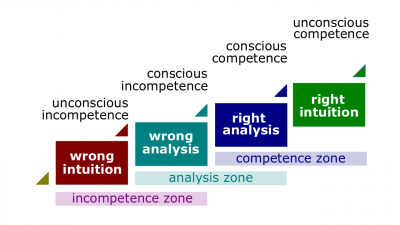Difference between revisions of "Programmed decision"
MariamKhalid (talk | contribs) (Created page with "Programmed decision is a repetitive decision that can be handled by a routine approach. ==Definition== According to Management by Robbins and Coulter (14th edition)...") |
|||
| (13 intermediate revisions by the same user not shown) | |||
| Line 1: | Line 1: | ||
| − | [[ | + | A [[programmed decision]] (hereinafter, the ''Decision'') is any [[decision]] to follow a [[policy]], [[operative rule]], another [[regulation]], or to routinely repeat one's previous decision that has been made while handling a similarly [[structured task]]. The [[decision-making approach|approach]] to [[decision-making]] can range from routinely-[[rational decision-making|rational]] at the beginning and to [[Unconscious competence|unconsciously]]-[[intuitive decision-making|intuitive]] while the number of the similar ''Decisions'' increase. |
| − | == | + | The ''Decisions'' are opposed to [[non-programmed decision]]s, which are unique and nonrecurring [[decision]]s that require custom-made [[solution]]s. |
| + | |||
| + | |||
| + | ==Definitions== | ||
According to [[Management by Robbins and Coulter (14th edition)]], | According to [[Management by Robbins and Coulter (14th edition)]], | ||
:[[Programmed decision]]. A repetitive [[decision]] that can be handled by a routine approach. | :[[Programmed decision]]. A repetitive [[decision]] that can be handled by a routine approach. | ||
| + | ==Competence== | ||
| + | :''Main wikipage: [[Structured-task competence]]'' | ||
| + | [[File:Competence-levels.png|400px|thumb|right|[[Structured-task competence]]]]'''[[Structured-task competence]]'''. A [[model]] that describes psychological states involved in the process of progressing from incompetence to analytical competence and, further, to intuitive competence in some knowledge, skill, and/or ability. | ||
| + | #[[Unconscious incompetence]] (or [[wrong intuition]]). A situation in which the individual neither understands nor knows how to accomplish a [[job task]] and does not necessarily recognize the deficit. | ||
| + | #[[Conscious incompetence]] (or [[wrong analysis]]). A situation in which the individual neither understands or knows how to accomplish a [[job task]], but he or she recognizes the deficit. He or she also realizes the value of new knowledge, skill, and/or ability needed in addressing the deficit. The making of mistakes can be integral to the learning process at this level of competence. | ||
| + | #[[Conscious competence]] (or [[right analysis]]). A situation in which the individual understands and/or knows how to accomplish a [[job task]]. However, demonstrating the knowledge, skill, and/or ability requires concentration. It may be broken down into steps, and there is heavy conscious involvement in executing the needed knowledge, skill, and/or ability. | ||
| + | #[[Unconscious competence]] (or [[right intuition]]). A situation in which the individual not only understands and knows how to accomplish a [[job task]], but has had so much practice with a skill that it has become "second nature" and can be performed easily. As a result, the skill can sometimes be performed while executing another [[job task]]. The individual may be able to teach it to others, depending upon how and when it was learned. | ||
[[Category: Management]][[Category: Articles]] | [[Category: Management]][[Category: Articles]] | ||
Latest revision as of 13:21, 15 June 2020
A programmed decision (hereinafter, the Decision) is any decision to follow a policy, operative rule, another regulation, or to routinely repeat one's previous decision that has been made while handling a similarly structured task. The approach to decision-making can range from routinely-rational at the beginning and to unconsciously-intuitive while the number of the similar Decisions increase.
The Decisions are opposed to non-programmed decisions, which are unique and nonrecurring decisions that require custom-made solutions.
Definitions
According to Management by Robbins and Coulter (14th edition),
- Programmed decision. A repetitive decision that can be handled by a routine approach.
Competence
- Main wikipage: Structured-task competence
Structured-task competence. A model that describes psychological states involved in the process of progressing from incompetence to analytical competence and, further, to intuitive competence in some knowledge, skill, and/or ability.
- Unconscious incompetence (or wrong intuition). A situation in which the individual neither understands nor knows how to accomplish a job task and does not necessarily recognize the deficit.
- Conscious incompetence (or wrong analysis). A situation in which the individual neither understands or knows how to accomplish a job task, but he or she recognizes the deficit. He or she also realizes the value of new knowledge, skill, and/or ability needed in addressing the deficit. The making of mistakes can be integral to the learning process at this level of competence.
- Conscious competence (or right analysis). A situation in which the individual understands and/or knows how to accomplish a job task. However, demonstrating the knowledge, skill, and/or ability requires concentration. It may be broken down into steps, and there is heavy conscious involvement in executing the needed knowledge, skill, and/or ability.
- Unconscious competence (or right intuition). A situation in which the individual not only understands and knows how to accomplish a job task, but has had so much practice with a skill that it has become "second nature" and can be performed easily. As a result, the skill can sometimes be performed while executing another job task. The individual may be able to teach it to others, depending upon how and when it was learned.
